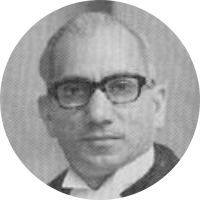R.S. Pathak

R.S. Pathak
Former Chief Justice of India
Assumed Office21st Dec, 1986
Retired On18th Jun, 1989
Previously
Judge of the International Court of Justice 1989 - 1991
Judge of the Supreme Court of IndiaFebruary 20th 1978 - December 20th 1986
Chief Justice of the Himachal Pradesh High Court March 18, 1972 - February 19th 1978
Permanent Judge of the High Court of AllahabadJuly 23rd 1963 - March 17th 1972
Additional Judge of the High Court of Allahabad October 1, 1962 - July 23rd 1963
Profile
He studied at Ewing Christian College and thereafter at Allahabad University in Allahabad. Justice Raghunandan Swarup Pathak practised in the Allahabad High Court on constitutional law, taxation laws, civil law, company law and industrial law.
He was appointed as an Additional Judge in 1962 and later a Permanent Judge of the Allahabad High Court in 1963. He became Chief Justice of Himachal Pradesh High Court in 1972. In February 1978, he was elevated to the Supreme Court of India and took over as the Chief Justice of India on December 21, 1986. He relinquished the office of the Chief Justice of India in 1989 after being appointed as a Judge in the International Court of Justice.
Justice Pathak passed away in 2007 due to a heart attack.
During his 11 year term at the Supreme Court, he authored 267 Judgments and was a part of 812 benches.
Justice R S Pathak mostly worked on cases about Direct Taxation, Service and Tenancy matters. He is also known for his judgments on Constitutional Law matters.
Notable Judgements
In Union Carbide Corporation v Union of India, Justice Pathak, along with E.S. Venkataramiah, Rangnath Misra, M.N. Venkatachalliah, and N.D. Ojha ordered a settlement of $ 470 million to be paid by Union Carbide against the initial compensation amount of $ 3 billion demanded by the Indian government. He reasoned that due to the pressing urgency to provide immediate and substantial relief to victims of the disaster, the case is pre-eminently fit for an overall settlement between the parties. The judgment also quashed all civil and criminal proceedings related to the Bhopal Gas Disaster.
Jagdish Saran v Union of India,1980 dealt with the validity of reservation of seats in Delhi University for postgraduate students domiciled in Delhi. Justice Pathak noted that excessive reservation could exclude ‘meritorious candidates’. However, he recognised that classification done to further equality is at the core of Article 14. He held that the preference given to students of Delhi does not ‘offend’ the constitutionally guaranteed right to equality.
In Kehar Singh v Union Of India (1988), the Court defined the scope of the President’s power to grant pardons. In 1988, a petition on behalf of Kehar Singh was filed to the President for a grant of pardon. He was convicted and sentenced to death for the assassination of then Prime Minister Indira Gandhi. The petitioners sought a hearing with the President to make a case for the pardon based on the merits of the case. The President stated that having a hearing was not part of the procedure to grant a pardon under Article 72. Further, the President stated that they could not examine the merits of a case already decided by the Supreme Court.
The petitioners filed a writ and special leave petition seeking clarity on the scope of the powers of the President under Article 72. The Court held that the President has the right to exercise their powers in a manner deemed fit by them. The Court also held that the petitioner did not have a right to a hearing before the President.
